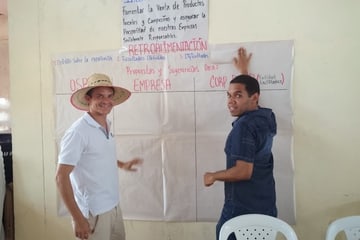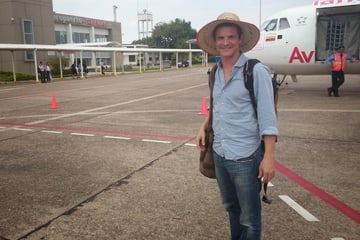"I never regretted leaving my well-paid job in Switzerland to start from scratch with an NGO in Colombia"
At the age of 35, Tony Zuber changed his career and started working in international cooperation abroad. In this interview, he talks about his motivation to do so, what it takes to be prepared and shares some useful advice.

Tony Zuber studied psychology and business administration. He followed a rather classical private sector career in Switzerland, working in the energy sector and was responsible for management development. At the age of 35, he decided to drastically change his career. He started working abroad in international cooperation with INTERTEAM (today Comundo) in Colombia, strengthening a national peace-building network. After eight years, he returned to Switzerland to co-lead in the Human Resources Department as Head of Education & Training in the Humanitarian Aid Unit at the Swiss Agency for Development and Cooperation (SDC). He helps train the 650 experts before going on missions abroad.
Interview by Nicoletta Cimmino
What made you leave your job with good conditions and a high salary and suddenly re-orient your career?
Several factors came together in the right constellation. A key memory that influenced me was when I was 16, Toni Rüttiman – aka Toni el Suizo – came to visit our class to give a presentation on the cooperation projects he’d been doing abroad. He built bridges to connect remote communities. That really made a lasting impression on me. I kept the idea of an adventurous and purposeful job in the back of my mind. The strongest influence, though, for sure, was my girlfriend at that time. She worked in international cooperation abroad and suggested that my professional skills in conflict management, facilitation, team-building and organisational development could be well-applied to international cooperation.
With the intention of being together, it would have been tough for her to find a job in Switzerland, not speaking the language(s). It was clear that I had to make the move and find something abroad. It was not an easy decision. I thought about this at length and did the research, making pro- and con-lists whether to move or stay. It is not the number of pro- or con-arguments that count, but how much weight you assign to them – the value they have to you. So, in the end, it was more of a gut-feeling decision.

How did you go about it? What advice can you give to people thinking of a career shift to international cooperation at a later point in their lives?
I just simply started googling to learn more about the sector, the organisations and their requirements: UN, ICRC, NGOs etc. And I found it isn’t easy to get in without any previous experience in the sector. During my research, I found INTERTEAM, now Comundo, specialising in technical cooperation and who send professionals abroad for three years to the Global South. Before you start looking for an organisation, it is, in any case, important to know your values and to know your strengths; your personal and technical competencies. And then think which of those competencies could be best applied to what organisation. This is obviously very difficult. It helps to talk to many people or seek professional advice/career counselling. In the beginning, be prepared to earn a lot less than you did before. It helps to have some savings for the first year or two. And be courageous. Swiss are oftentimes overtrained but tend to think that we’re unprepared for new challenges. Sometimes you just have to take a small risk.
When you started your new job in Colombia, wasn’t it tough to get accustomed to this new work and environment? Any best practices to share for a smooth transition?
It was definitely a rough start and a bit of a learning curve. Upon arrival, I was very eager to work. But things move at a different pace in Colombia. Punctuality, in particular, is not taken as seriously as in Switzerland. Many external factors influence your daily life, be it the non-functioning bus network or the regular electricity power cuts. So, my advice is to be patient. Start by taking an observer role to get a good picture before making interventions. Learning the language is also (almost) a must. When coming from a northern country, you may think that you know how to do things better than they do. They don’t do things worse, but rather just differently. You have to meet local people at eye level. And this starts with the salary. That’s what I also like about Comundo; we get paid similar salaries to local staff, putting us in a more “down-to-earth” position.
Before you start looking for an organisation, it is, in any case, important to know your values and to know your strengths; your personal and technical competencies.
Do you sometimes regret your decision to have left the private sector career in Switzerland?
No, never, to be honest. It was rather more difficult for me to come back to Switzerland after having lived in Colombia for eight years. I really embedded myself in the culture; I speak fluent Spanish, and my wife is Colombian. I struggled to get used to the Swiss way again; the rigid planning, how things need to get done, the lack of flexibility and spontaneity. Even though my job here at SDC is very rewarding, I would instead ask myself whether I regret having left Colombia, not whether it was a mistake to abandon my previous career.
I struggled to get used to the Swiss way again; the rigid planning, how things need to get done, the lack of flexibility and spontaneity.




